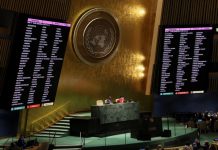
Bangladesh’s government and aid agencies have begun vaccinating the Rohingya refugees as a virus surge raises health risks in the sprawling, cramped camps where more than 1 million people, who fled Myanmar, are sheltering.
The International Federation of Red Cross and Red Crescent Societies said a national positivity rate of around 30% indicates the spread of COVID-19 is much higher, especially with cramped conditions and the risks faced by many people living in the refugee camps.
About 500 Bangladesh Red Crescent staff and volunteers joined the health workers for the campaign in collaboration with the U.N. refugee agency, according to a statement from the international body.
Rohingya community leaders, front-line health care volunteers in the camps, and Rohingya older than 55 are in the first group to be vaccinated.
The United Nations High Commissioner Filippo Grandi said that over “65,000 of the nearly 900,000 refugees will be vaccinated in the first cohort.”
Less than 5% population of the country’s 160 million people are fully vaccinated.
Bangladesh has reported more than 1.3 million infections, including 22,897 deaths from COVID-19 since the pandemic began.
The government of Prime Minister Sheikh Hasina bolstered its effort to get vaccines from other sources, particularly China, and began a new round of vaccinations nationwide starting last weekend.
More than 700,000 Rohingya fled Buddhist-majority Myanmar in 2017 as a harsh military crackdown was waged against the ethnic group following an attack by insurgents.
The 2017 crackdown included rapes, killings and the torching of thousands of homes, and was termed ethnic cleansing by global rights groups and the United Nations.









